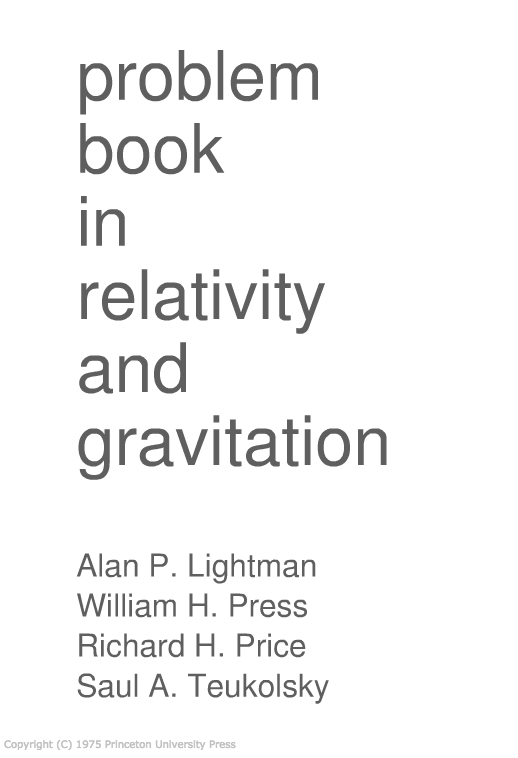If I were ever to publish a second edition of Spacetime and Geometry — unlikely, but check back in another ten years — one thing I would like to do would be to increase the number of problems at the end of each chapter. I like the problems that are there, but they certainly could be greater in number. And there is no solutions manual, to the chagrin of numerous professors over the last decade.
What I usually do, when people ask for solutions and/or more problems, is suggest that they dig up a copy of the Problem Book in Relativity and Gravitation by Lightman, Press, Price, and Teukolsky. It’s a wonderful resource, with twenty chapters chock-full of problems, all with complete solutions in the back. A great thing to have for self-study. The book is a bit venerable, dating from 1975, and the typesetting isn’t the most modern; but the basics of GR haven’t changed in that time, and the notation and level are a perfect fit for my book.
And now everyone can have it for free! Where by “now” I mean “for the last five years,” although somehow I never heard of this. Princeton University Press, the publisher, gave permission to put the book online, for which students everywhere should be grateful.
[Edit: apparently as of Sept 2017, PUP changed their mind, so the book is no longer available for free. You can still buy it from Amazon.]
If you’re learning (or teaching) general relativity, you owe yourself to check it out.

Would be nice if they put a pdf version. In any event I liked the problems in Sean’s book, most of which I worked out.
Reminder (inspired by a now-deleted comment): the comment sections are meant to focus on the subject of the blog post, not to serve as an open-ended forum for discussing your favorite questions and/or theories.
I always wanted to learn or teach myself how to do theoretical physics from reading popular books about it. Then it always pains me to read a lot of the authors mentioning that just the juicy stuff without mathematical details will be involved in the book. Then I go into reading them not learning much of anything that I haven’t read before, as it is mostly just a summery of the most famous physics experiments. I thought I could have had a lot more time better well spent learning some of the actual physics behind it. Then looking at this book it doesn’t seem like it would be anything that would be any help in that regard. It looks like it just spits equations out at you and says to solve them. I have been looking for something more along the lines of derivations and explanations as to how scientist came to them (if such a thing happened or exist). If there where other people like me, I think there would be a real market for it. Not really much for the laymen to do anymore, since physics has surpassed and superseded logic itself…
Take a little at A. Zee’s new book, Einstein Gravity in a Nutshell. Plenty of history, anecdotes etc.
Unfortunately, it is Flash based, making it unreadable on mobile devices.
I hope in the future, some effort will be put in to make it web friendly, like The Feynman Lectures on Physics [ http://www.feynmanlectures.info/ ]
“Sean Carroll says:
February 11, 2015 at 12:56 pm
Reminder (inspired by a now-deleted comment): the comment sections are meant to focus on the subject of the blog post, not to serve as an open-ended forum for discussing your favorite questions and/or theories.”
Aw common, that’s no fun.
Thanks. Just what I’ve been looking for.
Hi Sean, I just saw the World Science Festival video hosted by Briane Greene in which you and other physicists discuss the dilemma and solutions for current QM.
Could you please explain more about the ‘many worlds’ view on QM?
I know you are busy but I’d really appreciate if you could
Thanx
Joonhyup
FLASH? What year is this? Can only print out one page at a time. It’s “free” but they make you work for it. I hope that this is only because the web programmer they hired only had Flash in his/her toolkit. Or the publisher required it as a condition. Otherwise they are dinosaurs, like presenters who still use overhead transparencies. Sorry Roger Penrose. 😉